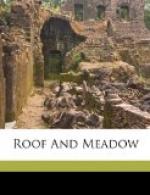In the yellow light I could make out the line of sentinel trees across the marsh, and off on the bay a ship, looming dim in the distance, coming on with wind and tide. There were no sounds except the long regular wash of the waves, the stir of the breeze in the chafing sedges, and the creepy stepping of the water weaving everywhere through the hidden paths of the grass. Presently a night-hawk began to flit about me, then another and another, skimming just above the marsh as silent as the shadows. What was that? Something moved across the moon. In a moment, bat-like and huge against the great yellow disk, appeared a marsh-owl. He was coming to look at me. What was I that dared remain abroad in the marsh after the rising of the moon? that dared invade this eery realm, this night-spread, tide-crept, half-sealand where he was king? How like a goblin he seemed! I thought of Grendel, and listened for the splash of the fen-monster’s steps along the edge of the bay. But only the owl came. Down, down, down he bobbed, till I could almost feel the fanning of his wings. How silent! His long legs hung limp, his body dangled between those soft wide wings within reach of my face. Yet I heard no sound. Mysterious creature! I was glad when he ceased his ghostly dance about me and made off.
It was nine o’clock. The waves had ceased to wash against the sand, for the beach was gone; the breeze had died away; the stir of the water in the grass was still. Only a ripple broke now and then against my little island. The bay and the marsh were one.
How still the plains of the
waters be!
The tide is in his ecstasy.
The tide is at his highest
height:
And
it is night.
CALICO AND THE KITTENS
[Illustration]
CALICO AND THE KITTENS
One spring day I found myself the sole help of two blind, naked infants—as near a real predicament as a man could well get. What did it matter that they had long tails and were squirrels? They were infants just the same; and any kind of an infant on the hands of any mere man is a real tragedy.
As I looked at the two callow things in the grass, a dismay and weak helplessness quite overcame me. The way they squirmed and shivered and squeaked worked upon me down even to my knees. I felt sick and foolish. Both of their parents were dead. Their loose leaf-nest overhead had been riddled with shot. I had climbed up and found them; I had brought them down; I must—feed them! The other way of escape were heathen.
But how could I feed them? Nipples, quills, spoons—none of them would fit these mites of mouths. What a miserable mother I was! How poorly equipped for foundlings! They were dying for lack of food; and as they pawed about and whimpered in my hands I devoutly wished the shot had put them all out of misery together. I was tempted to turn heathen and despatch them.




